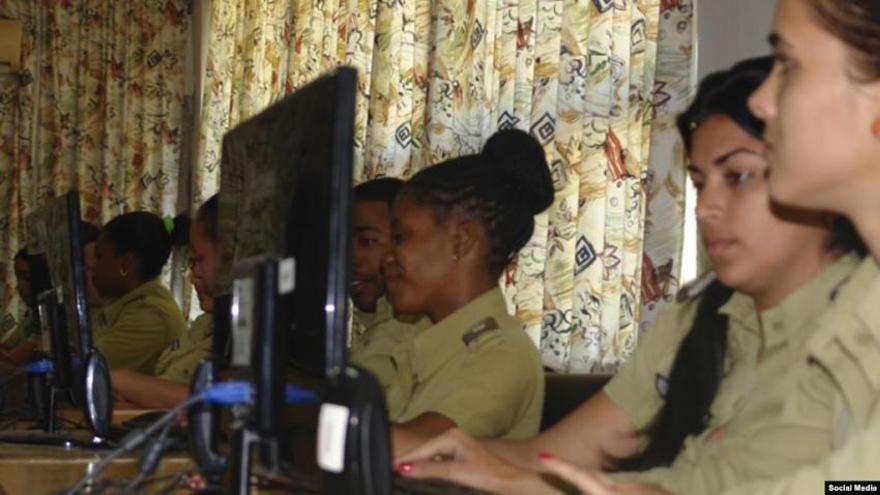
![]() 14ymedio/Yucabyte, Havana, 22 January 2024 — The recruitment of cyberclarias (catfishers)* – the digital infantry of the Cuban regime – a hypothetical legalization of protests and the increase in clandestine gaming have stood out among the rumors collected in December by associates of 14ymedio and Yucabyte. The discontent of Cubans has been expressed openly on social networks, and the regime is now paying attention.
14ymedio/Yucabyte, Havana, 22 January 2024 — The recruitment of cyberclarias (catfishers)* – the digital infantry of the Cuban regime – a hypothetical legalization of protests and the increase in clandestine gaming have stood out among the rumors collected in December by associates of 14ymedio and Yucabyte. The discontent of Cubans has been expressed openly on social networks, and the regime is now paying attention.
With instructions from the Communist Party, a squad of Public Health leaders – alleges a rumor that circulated as a WhatsApp audio – held several meetings in medical schools and hospitals in Holguín and Ciego de Ávila. The agenda: to attract workers willing to “share revolutionary content” in their personal accounts in the face of the well-known “media war” that keeps the regime up at night.
Other rumors on the subject indicate that, in parallel, the Communist Party has reactivated hundreds of anonymous profiles and computer programs to flood the internet with hashtags favorable to the Government
Other rumors on the subject indicate that, in parallel, the Communist Party has reactivated hundreds of anonymous profiles and computer programs to flood the internet with hashtags favorable to the Government. Cyberclarias are also given training courses to better develop their work, along with “cyber defense” workshops.
For Etecsa, the State communications monopoly, 2024 will be the year of “cybersecurity.” Interviewed by the official press, its Business Director, Daniel Ramos, announced with great fanfare that the first class of engineers in Cybersecurity, a recent career taught at the University of Computer Sciences, is active. The educational center, which has always served as the regime’s headquarters for digital affairs, will lead a “fight against cybercrime” in the face of the alarming increase in incidents recorded by Etecsa, more than 2,600 last year.
Social disagreement will overflow the networks at some point, and it won’t take long to reach the streets, some rumors imply. The Government has planned for it, they add, and therefore is planning to legalize popular protests. Aware of Havana’s mode of operation, many commentators have warned that the origin of the rumor may be the Government itself, which tests public opinion and tries to “hunt” potential demonstrators.
Others say that the National Assembly had a “Demonstration and Meeting Law” on its schedule for 2022, which was never debated openly and was removed from the plan in 2023, without any explanation.
December, a “hot” month when it comes to violence and insecurity, brought abundant rumors about murders, disappearances and violent robberies. The images about police brutality were not far behind: agents beating individuals already immobilized, comments on arbitrary confiscations and harassment of pushcart sellers and farmers were just some of the incidents reported.
The end-of-year parties, users alleged, were nothing to celebrate: fairs understocked and with rotten food, inability to get food and inaction in the face of crime were the only things that the Government offered to Cubans, they criticized. The tension increased with the rumor, at the end of the year, that the ration book, indispensable for the poorest on the Island, was disappearing.
The Ministry of Internal Trade denied these rumors, but the so-called economic package – officially announced – promises a year of maximum austerity for Cubans, after a critical 2023.
The return to the public sphere of diplomat Manuel Rocha and former American analyst Ana Belén Montes, two former spies in the service of Havana, generated a series of rumors about Cuban intelligence services
The growing activity of the burles – informal and illegal casinos – is a symptom of the need of Cubans to obtain money quickly and at all costs. In many of these businesses, several users complain, it is common for children to get involved, “with money in hand” and alcohol, in the organization of the games.
The return to the public sphere of diplomat Manuel Rocha and former American analyst Ana Belén Montes, two former spies in the service of Havana, generated a series of rumors about the Cuban intelligence services. According to several users, the arrest of Montes in 2001 at the hands of the FBI and the disclosure of the links of Rocha, former deputy director of the U.S. Interests Section in Havana, with the regime, testify to the state of corruption of Cuban espionage.
The Directorate of Intelligence of the Island has numerous flaws, and its negligence – they add – made it easier for the United States to access information to expose Rocha and Montes. When newspapers around the world made headlines with both former spies, Javier Milei, the President of Argentina, announced that Cuban and Venezuelan agents living in Argentina had instructions to instigate a protest.
A few days later, several rumors claimed that the Argentine authorities had captured an alleged Cuban spy: Alejandro Odriozola Diez, head of Intelligence of the Cuban Embassy in Buenos Aires.
*Translator’s note: ’Catfishing’ is pretending to be someone else online, stealing someone’s identity.
Translated by Regina Anavy
____________
COLLABORATE WITH OUR WORK: The 14ymedio team is committed to practicing serious journalism that reflects Cuba’s reality in all its depth. Thank you for joining us on this long journey. We invite you to continue supporting us by becoming a member of 14ymedio now. Together we can continue transforming journalism in Cuba.
